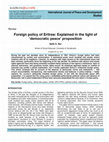Papers by Salih O . Noor

After decades, structural adjustment programs (SAPs) policies had horrific economic and social co... more After decades, structural adjustment programs (SAPs) policies had horrific economic and social consequences. In the view of the international financial institutions (IFIs), the failure of SAPs to generate economic growth was solely due to bad governance in lowincome countries. The notion of good governance as the only recipe for development was devised in the late 1980s, and continues to drive international development policy. The IFIs shifted gears to the Poverty Reduction Strategy Papers (PRSPs), launched in 1999, turning the rhetoric of development policy to what SAPs disregarded: poverty reduction. After more than a decade, however, poverty in absolute terms continues to rise in developing countries, and global income and wealth inequality widen. Moreover, the professed shift in development approach has been mainly in rhetoric. There is little empirical evidence of a genuine shift away from neoliberal free market principles. This article seeks to trace annals of this ideological...

Hopes that "third wave" transitions in sub-Saharan Africa in the early 1990s wo... more Hopes that "third wave" transitions in sub-Saharan Africa in the early 1990s would usher in a new era of liberal democracy vanished fairly quickly when new forms of liberalized authoritarianism emerged. Illiberal democracy has taken hold as the political trajectory shifted from an opening to a closure when the wave of regime transitions lost steam by the end of the decade. Unlike a relatively steady process of democratic consolidation and a renewed democratic awakening in post-Communist Europe, the region saw continued democratic erosion or breakdown of democratically elected governments and the institutionalization of various illiberal, semi-authoritarian regimes by the turn of the century. Contrary to presumptions of a rebirth of liberal democracy prevalent among some scholars and policy-makers, third wave democratization in Africa predominantly ended up in illiberal democracies and stable semi-authoritarian regimes. Based on a cross-regional analysis and new data made available only recently, this article examines the levels of institutionalization of three main features of democracy: elections, liberal democracy, and the rule of law. It employs a path-dependent institutional approach that focuses on political institutions—both formal and informal—both as causal explanations for the democratic deficit of the transitions and as objects of study in the analysis of democratic consolidation or lack thereof.

International Journal of Peace and Development Studies, Sep 30, 2013
During the past two decades since its independence in 1991, Eritrea's foreign policy had been cha... more During the past two decades since its independence in 1991, Eritrea's foreign policy had been characterized by conflict and confrontation. It maintained pretty much troubled and usually violent relations with all its neighbors. Likewise, its relations with major powers at the international arena had been strained, particularly since the beginning of the last decade. Its relations with donors and human rights agencies have also being extremely troubled mainly because of the regime's intolerance, fears of external subversion, and gruesome human rights record. An analytical approach based on conflict of interests may proffer a partial explanation, but it hardly explicates Eritrea's militarized foreign policy. This article contends that an account of the absence of democratic norms and institutionsthat ensure accountability, transparency, and institutional checks and balances in policy-makingbetter explains the country's awkwardly troubled foreign policy. In line with the democratic peace (DP) proposition, it is argued that the ruling party's embedded authoritarian political culture and absence of democratic rule in post-independent Eritrea have seriously jeopardized the new nation's foreign policy.
The Journal of Modern African Studies, 2015

Hopes that "third wave" transitions in sub-Saharan Africa in the early 1990s would usher in a new... more Hopes that "third wave" transitions in sub-Saharan Africa in the early 1990s would usher in a new era of liberal democracy vanished fairly quickly when new forms of liberalized authoritarianism emerged. Illiberal democracy has taken hold as the political trajectory shifted from an opening to a closure when the wave of regime transitions lost steam by the end of the decade. Unlike a relatively steady process of democratic consolidation and a renewed democratic awakening in post-Communist
Europe, the region saw continued democratic erosion or breakdown of
democratically elected governments and the institutionalization of various illiberal, semi-authoritarian regimes by the turn of the century. Contrary to presumptions of a rebirth of liberal democracy prevalent among some scholars and policy-makers, third wave democratization in Africa predominantly ended up in illiberal democracies and stable semi-authoritarian regimes. Based on a cross-regional analysis and new data made available only recently, this article examines the levels of institutionalization of three main features of democracy: elections, liberal
democracy, and the rule of law. It employs a path-dependent institutional approach that focuses on political institutions—both formal and informal—both as causal explanations for the democratic deficit of the transitions and as objects of study in the analysis of democratic consolidation or lack thereof.

After decades, structural adjustment programs (SAPs) policies had horrific economic and social co... more After decades, structural adjustment programs (SAPs) policies had horrific economic and social consequences. In the view of the international financial institutions (IFIs), the failure of SAPs to generate economic growth was solely due to bad governance in low-income countries. The notion of good governance as the only recipe for development was devised in the late 1980s, and continues to drive international development policy. The IFIs shifted gears to the Poverty Reduction Strategy Papers (PRSPs), launched in 1999, turning the rhetoric of development policy to what SAPs disregarded: poverty reduction. After more than a decade, however, poverty in absolute terms continues to rise in developing countries, and global income and wealth inequality widen. Moreover, the professed shift in development approach has been mainly in rhetoric. There is little empirical evidence of a genuine shift away from neoliberal free market principles. This article seeks to trace annals of this ideological dogmatism by critically examining the policy paradigms—SAPs and PRSPs—promoted under the rubric of good governance in poor countries. It examines the free market neoliberal orthodoxy that underlies development policy and the global consensus around good governance. The new consensus rests on “re-branding and re-spinning new progressive outfits” that constitute the best ideological shell of neoliberalism today.

During the past two decades since its independence, Eritrea's foreign policy has been characteriz... more During the past two decades since its independence, Eritrea's foreign policy has been characterized by conflict and confrontation. It had pretty troubled and often violent relations with all its neighbors. Likewise, relations with major international powers, cold to start with, have become strained since the early 2000s. The country has also experienced from the outset difficult relations with donors and other international agencies mainly because of the regime's intolerance of foreign influence, fears of external subversion, and ever worsening human rights record. An analytical approach based on conflict of interests may provide a partial explanation of Eritrea's foreign policy, but it scarcely explains the country's incredibly troubled relations both regionally and internationally. In line with the democratic peace (DP) proposition, this article contends that the absence of democratic norms and institutions -that ensure accountability, transparency, and institutional checks and balances in policymaking -better explains the country's stressed foreign policy. I argue that the ruling party's embedded authoritarian political culture and absence of democratic rule in postindependent Eritrea have defined and seriously jeopardized the nation's external relations.
Book Reviews by Salih O . Noor
Democracy in Africa: Successes, Failures, and the Struggle for Political Reform, 2017
Democratic trajectories in Africa: Unraveling the impact of foreign aid, edited by Danielle Resni... more Democratic trajectories in Africa: Unraveling the impact of foreign aid, edited by Danielle Resnick and Nicolas van de Walle. Oxford: Oxford University Press, 2013. xv + 310 pp. £60.00 (hardback). ISBN 978 0 19968 628 5.
Book chapters by Salih O . Noor
Thematic reports/working papers/other by Salih O . Noor

After more than five decades of violent conflict and millions of deaths, Sudan's southern region ... more After more than five decades of violent conflict and millions of deaths, Sudan's southern region has voted for secession in a referendum on self-determination early this year. Sudan, once Africa's largest state, broke-up into two entities giving birth to an ethnically and religiously distinct state constituting one-third of its territory. The event was a culmination of an irreconcilable antagonism in Sudan's post-independence politics, largely centred in an intractable conflict between a dominant, mostly Arab-Islamic North pursuing centralization and Arabization policies and a black-African, mostly Christian-animist South resisting political marginalization and cultural domination. In a wider context, the partition of Sudan clearly reveals a deep dilemma of national unity versus national autonomy afflicting African state system for decades. It's a political conundrum involving a contradiction between the imperative of state-power centralization and demands for democratic decentralism, played in a backdrop of enormous religious, ethnic and national diversity. The impasse stems from the infamous Berlin conference (1884-85) that endorsed the scramble of Africa among European colonial powers. It unleashed a whole reckless process of grand territorial acquisitions and spheres of influence, leaving behind arbitrary geometric lines bereft of any cultural, historic or economic logic. In effect, the African state became a shaky conglomeration of diverse ethnic groups, tribes and nationalities harboring mutual mistrust, rivalry and even secession. Throughout the post-independence period, many of these boundaries were violently contested between the dominant state seeking their preservation and ethnic/regional dissent forces seeking alteration. Soon after decolonization, revisionist demands proliferated across the continent but were crashed or contained by a combination of a newly established legal order, diplomatic regimes and military power. Legitimate demands for autonomy or independence were seen as threats to unity and territorial integrity. However, despite a continental consensus to preserve the status quo and consistent repression of such demands, the dilemma of national unity vs. autonomy—and the ensuing danger of disintegration—occupied the center-stage of African politics. This conflict of fundamental principles was further compounded by popular demands for democratic rule and increasing external intervention as Africa entered the post-cold war period. The secession of South Sudan, a symptom and outcome of this dilemma, begs some critical questions in as much as it highlights the nature of the political predicament. Does Africa still remain prone to balkanization? Is African post-colonial legal order now in disorder and ripe to major revision? Is Africa's dominant/hegemonic state bound to disintegration notwithstanding rising ethno-nationalism that tore apart the former Soviet Union and Yugoslavia? Domination and resistance In much of post-colonial Africa, pervasive and persistent conflicts over contested territories or nationalist/secessionist challenges to territorial integrity became almost the norm. The conflict between state domination and national resistance, in particular, quickly took the centre stage of African politics no later than the state emerged itself. It is a conflict of two mutually antagonistic principles; that is the principle of territorial integrity and people's right to self-determination: The nexus of many of these conflicts resides in a status quo which gives primacy to territorial integrity over the right of peoples to self-determination…[this]legitimated the violation of

It has been a decade since peace between Eritrea and Ethiopia was forestalled after the latter re... more It has been a decade since peace between Eritrea and Ethiopia was forestalled after the latter rejected a 'final and binding' judicial verdict in September 2003. Since then, Ethiopia and Eritrea have been locked in a virtual cold war. At the heart of the crisis is a ruling by an independent Boundary Commission established in accordance to the Algiers peace treaty (December 2000) to delimit and demarcate the contested border. Having initially welcomed the ruling, Ethiopia reversed its position upon learning that Badme, the flashpoint of the war, was awarded to Eritrea. After seeking revision for more than two years, Ethiopia has made a partial shift toward accepting a judgment it previously discredited as " unjust and illegal. " However, it has been insisting on a dialogue " to achieve normalization and to address all issues that have been at the root of the crisis. " On the contrary, Eritrea adamantly rejects dialogue until Ethiopia unconditionally accepts implementation of the border ruling. These contradictory positions brought the process of conflict resolution to a standstill in 2004. The Boundary Commission dissolved itself in 2007 before meeting its full mandate. It has submitted both parties a virtually demarcated border map. Eritrea and Ethiopia returned to arms in 1998, less than a decade after the previous war ended in 1991. With both nations expected to focus on development, this war had not been anticipated. The latest conflict was marked not only by considerable destruction but also by the evident venom between the two sides. Relations are still marked by mutual recrimination, sabre-rattling, and destabilization. Although each claims to be against another war, the risk of escalation remains high along their border, the most militarized on the continent. Both sides continue to undermine each other's stability, from supporting each other's armed opposition groups to waging a proxy war in Somalia. At the turn of this decade, prospects and talk of peace between the two enemies has virtually vanished. Today, however, the prospects for peace seem better as both governments are expressing their readiness for peace while nursing the wounds of a decade of cold war which is apparently winding down. But how could lasting peace between these arch-enemies be achieved? The last decade has proved peace is a very intricate puzzle. Part of the answer lies in scrutinizing past peace attempts. New initiatives must build on previous achievements and should resolve the outstanding issues that thwarted previous attempts. Therefore, the search for peace must begin by asking why the Algiers peace process failed. The Challenges to Algiers Peace Process Today, there are no discernible signs that the Algiers Agreement can provide a framework for permanent settlement. After the agreement ended the fighting, the two sides simply shifted to a cold war, taking up very hostile and antagonistic positions in every conceivable issue and forum. Some believe Algiers failed because neither Ethiopia nor Eritrea had any real interest in peace. This is partially true; both governments showed a willingness to thwart the process and escalate tensions. Notwithstanding this reluctance, however, a multitude of real and complex issues hindered peaceful resolution of the conflict. With hindsight, some substantive and procedural issues have fatally undermined the process of conflict resolution. First, the Algiers process foundered because it failed to address the root causes of the war. Were the causes of the conflict sufficiently understood when the agreement was framed? Absolutely not. Behind a presumed border war laid a multitude of factors ranging from long-term conflict on narratives of history and national
What are informal political institutions? How different colonial institutions differently impact ... more What are informal political institutions? How different colonial institutions differently impact long-term economic and political development in former European colonies? What is the role of informal political institutions in the political stability of democratic and authoritarian regimes in post-colonial Africa? What is the dialectical relationship between formal state institutions and informal institutions of personal rule, ethnic clientelism and patronage? How informal institutions affect the public sphere,











Uploads
Papers by Salih O . Noor
Europe, the region saw continued democratic erosion or breakdown of
democratically elected governments and the institutionalization of various illiberal, semi-authoritarian regimes by the turn of the century. Contrary to presumptions of a rebirth of liberal democracy prevalent among some scholars and policy-makers, third wave democratization in Africa predominantly ended up in illiberal democracies and stable semi-authoritarian regimes. Based on a cross-regional analysis and new data made available only recently, this article examines the levels of institutionalization of three main features of democracy: elections, liberal
democracy, and the rule of law. It employs a path-dependent institutional approach that focuses on political institutions—both formal and informal—both as causal explanations for the democratic deficit of the transitions and as objects of study in the analysis of democratic consolidation or lack thereof.
Book Reviews by Salih O . Noor
Book chapters by Salih O . Noor
Thematic reports/working papers/other by Salih O . Noor
Europe, the region saw continued democratic erosion or breakdown of
democratically elected governments and the institutionalization of various illiberal, semi-authoritarian regimes by the turn of the century. Contrary to presumptions of a rebirth of liberal democracy prevalent among some scholars and policy-makers, third wave democratization in Africa predominantly ended up in illiberal democracies and stable semi-authoritarian regimes. Based on a cross-regional analysis and new data made available only recently, this article examines the levels of institutionalization of three main features of democracy: elections, liberal
democracy, and the rule of law. It employs a path-dependent institutional approach that focuses on political institutions—both formal and informal—both as causal explanations for the democratic deficit of the transitions and as objects of study in the analysis of democratic consolidation or lack thereof.